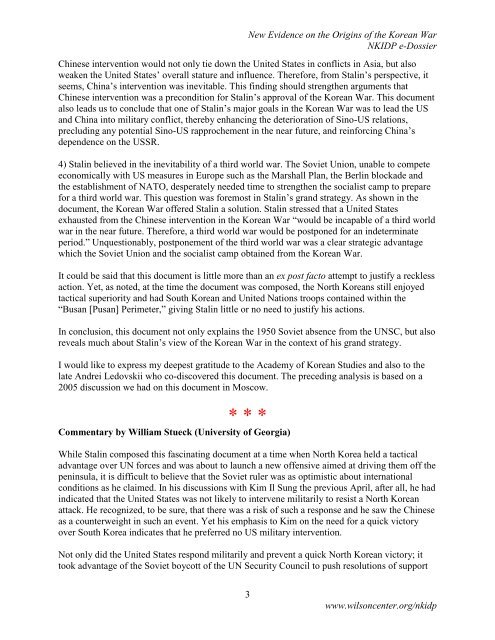Did Stalin Lure the United States into the Korean War? - Woodrow ...
Did Stalin Lure the United States into the Korean War? - Woodrow ...
Did Stalin Lure the United States into the Korean War? - Woodrow ...
Create successful ePaper yourself
Turn your PDF publications into a flip-book with our unique Google optimized e-Paper software.
New Evidence on <strong>the</strong> Origins of <strong>the</strong> <strong>Korean</strong> <strong>War</strong><br />
NKIDP e-Dossier<br />
Chinese intervention would not only tie down <strong>the</strong> <strong>United</strong> <strong>States</strong> in conflicts in Asia, but also<br />
weaken <strong>the</strong> <strong>United</strong> <strong>States</strong>’ overall stature and influence. Therefore, from <strong>Stalin</strong>’s perspective, it<br />
seems, China’s intervention was inevitable. This finding should streng<strong>the</strong>n arguments that<br />
Chinese intervention was a precondition for <strong>Stalin</strong>’s approval of <strong>the</strong> <strong>Korean</strong> <strong>War</strong>. This document<br />
also leads us to conclude that one of <strong>Stalin</strong>’s major goals in <strong>the</strong> <strong>Korean</strong> <strong>War</strong> was to lead <strong>the</strong> US<br />
and China <strong>into</strong> military conflict, <strong>the</strong>reby enhancing <strong>the</strong> deterioration of Sino-US relations,<br />
precluding any potential Sino-US rapprochement in <strong>the</strong> near future, and reinforcing China’s<br />
dependence on <strong>the</strong> USSR.<br />
4) <strong>Stalin</strong> believed in <strong>the</strong> inevitability of a third world war. The Soviet Union, unable to compete<br />
economically with US measures in Europe such as <strong>the</strong> Marshall Plan, <strong>the</strong> Berlin blockade and<br />
<strong>the</strong> establishment of NATO, desperately needed time to streng<strong>the</strong>n <strong>the</strong> socialist camp to prepare<br />
for a third world war. This question was foremost in <strong>Stalin</strong>’s grand strategy. As shown in <strong>the</strong><br />
document, <strong>the</strong> <strong>Korean</strong> <strong>War</strong> offered <strong>Stalin</strong> a solution. <strong>Stalin</strong> stressed that a <strong>United</strong> <strong>States</strong><br />
exhausted from <strong>the</strong> Chinese intervention in <strong>the</strong> <strong>Korean</strong> <strong>War</strong> “would be incapable of a third world<br />
war in <strong>the</strong> near future. Therefore, a third world war would be postponed for an indeterminate<br />
period.” Unquestionably, postponement of <strong>the</strong> third world war was a clear strategic advantage<br />
which <strong>the</strong> Soviet Union and <strong>the</strong> socialist camp obtained from <strong>the</strong> <strong>Korean</strong> <strong>War</strong>.<br />
It could be said that this document is little more than an ex post facto attempt to justify a reckless<br />
action. Yet, as noted, at <strong>the</strong> time <strong>the</strong> document was composed, <strong>the</strong> North <strong>Korean</strong>s still enjoyed<br />
tactical superiority and had South <strong>Korean</strong> and <strong>United</strong> Nations troops contained within <strong>the</strong><br />
“Busan [Pusan] Perimeter,” giving <strong>Stalin</strong> little or no need to justify his actions.<br />
In conclusion, this document not only explains <strong>the</strong> 1950 Soviet absence from <strong>the</strong> UNSC, but also<br />
reveals much about <strong>Stalin</strong>’s view of <strong>the</strong> <strong>Korean</strong> <strong>War</strong> in <strong>the</strong> context of his grand strategy.<br />
I would like to express my deepest gratitude to <strong>the</strong> Academy of <strong>Korean</strong> Studies and also to <strong>the</strong><br />
late Andrei Ledovskii who co-discovered this document. The preceding analysis is based on a<br />
2005 discussion we had on this document in Moscow.<br />
* * *<br />
Commentary by William Stueck (University of Georgia)<br />
While <strong>Stalin</strong> composed this fascinating document at a time when North Korea held a tactical<br />
advantage over UN forces and was about to launch a new offensive aimed at driving <strong>the</strong>m off <strong>the</strong><br />
peninsula, it is difficult to believe that <strong>the</strong> Soviet ruler was as optimistic about international<br />
conditions as he claimed. In his discussions with Kim Il Sung <strong>the</strong> previous April, after all, he had<br />
indicated that <strong>the</strong> <strong>United</strong> <strong>States</strong> was not likely to intervene militarily to resist a North <strong>Korean</strong><br />
attack. He recognized, to be sure, that <strong>the</strong>re was a risk of such a response and he saw <strong>the</strong> Chinese<br />
as a counterweight in such an event. Yet his emphasis to Kim on <strong>the</strong> need for a quick victory<br />
over South Korea indicates that he preferred no US military intervention.<br />
Not only did <strong>the</strong> <strong>United</strong> <strong>States</strong> respond militarily and prevent a quick North <strong>Korean</strong> victory; it<br />
took advantage of <strong>the</strong> Soviet boycott of <strong>the</strong> UN Security Council to push resolutions of support<br />
3<br />
www.wilsoncenter.org/nkidp

















